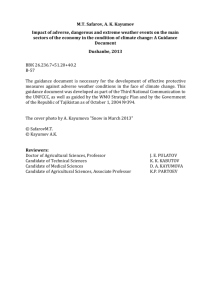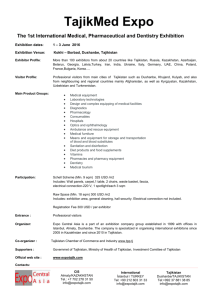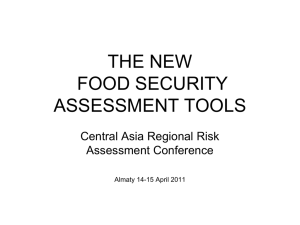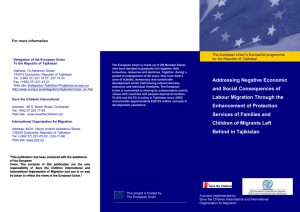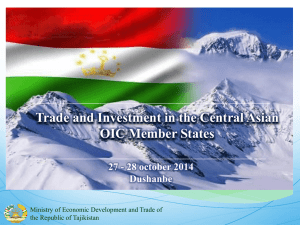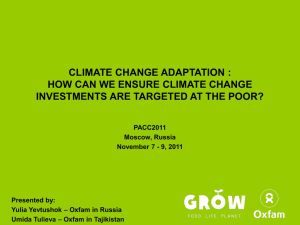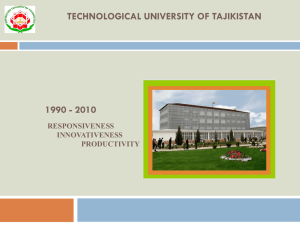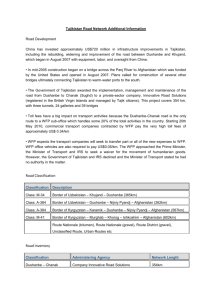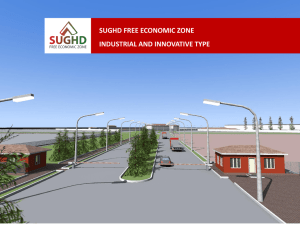IV. Reporting
advertisement
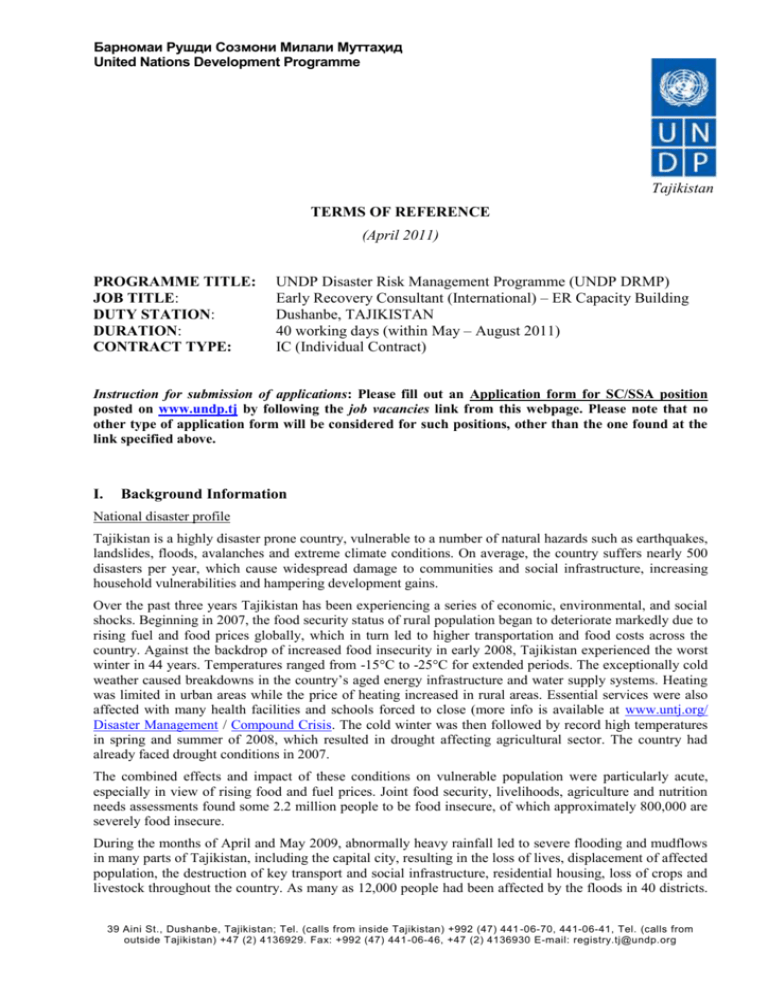
Барномаи Рушди Созмони Милали Муттаҳид United Nations Development Programme Tajikistan TERMS OF REFERENCE (April 2011) PROGRAMME TITLE: JOB TITLE: DUTY STATION: DURATION: CONTRACT TYPE: UNDP Disaster Risk Management Programme (UNDP DRMP) Early Recovery Consultant (International) – ER Capacity Building Dushanbe, TAJIKISTAN 40 working days (within May – August 2011) IC (Individual Contract) Instruction for submission of applications: Please fill out an Application form for SC/SSA position posted on www.undp.tj by following the job vacancies link from this webpage. Please note that no other type of application form will be considered for such positions, other than the one found at the link specified above. I. Background Information National disaster profile Tajikistan is a highly disaster prone country, vulnerable to a number of natural hazards such as earthquakes, landslides, floods, avalanches and extreme climate conditions. On average, the country suffers nearly 500 disasters per year, which cause widespread damage to communities and social infrastructure, increasing household vulnerabilities and hampering development gains. Over the past three years Tajikistan has been experiencing a series of economic, environmental, and social shocks. Beginning in 2007, the food security status of rural population began to deteriorate markedly due to rising fuel and food prices globally, which in turn led to higher transportation and food costs across the country. Against the backdrop of increased food insecurity in early 2008, Tajikistan experienced the worst winter in 44 years. Temperatures ranged from -15°C to -25°C for extended periods. The exceptionally cold weather caused breakdowns in the country’s aged energy infrastructure and water supply systems. Heating was limited in urban areas while the price of heating increased in rural areas. Essential services were also affected with many health facilities and schools forced to close (more info is available at www.untj.org/ Disaster Management / Compound Crisis. The cold winter was then followed by record high temperatures in spring and summer of 2008, which resulted in drought affecting agricultural sector. The country had already faced drought conditions in 2007. The combined effects and impact of these conditions on vulnerable population were particularly acute, especially in view of rising food and fuel prices. Joint food security, livelihoods, agriculture and nutrition needs assessments found some 2.2 million people to be food insecure, of which approximately 800,000 are severely food insecure. During the months of April and May 2009, abnormally heavy rainfall led to severe flooding and mudflows in many parts of Tajikistan, including the capital city, resulting in the loss of lives, displacement of affected population, the destruction of key transport and social infrastructure, residential housing, loss of crops and livestock throughout the country. As many as 12,000 people had been affected by the floods in 40 districts. 39 Aini St., Dushanbe, Tajikistan; Tel. (calls from inside Tajikistan) +992 (47) 441 -06-70, 441-06-41, Tel. (calls from outside Tajikistan) +47 (2) 4136929. Fax: +992 (47) 441 -06-46, +47 (2) 4136930 E-mail: registry.tj@undp.org Барномаи Рушди Созмони Милали Муттаҳид United Nations Development Programme Some 3,000 persons were displaced, and 26 killed. More than 2,000 residential and administrative buildings were partially or fully damaged. In January 2010 an earthquake of a magnitude of 5.3 on the Richter scale struck twenty three villages in Vanj district in the Gorno-Badakhshan Autonomous Oblast (GBAO) of Tajikistan. 28 houses were completely destroyed and over 1,000 were damaged. 66 social facilities (including schools, hospitals and administrative buildings) were affected. In May 2010 torrential rains hit Eastern Khatlon province of Tajikistan, causing a flash flood which destroyed the houses and belongings of 4,500 people in Kulyab city, killing at least 19 people. In the surrounding rural areas numerous floods, landslides and mudflows affected 16,000 people. Some had their houses destroyed, others lost their livelihoods when their crops and agricultural land were buried under mud, rocks and debris and their livestock was killed. Disaster Response and Recovery in Tajikistan Although the disaster response is relevantly well organised and coordinated in Tajikistan through disaster risk management coordination partnership “REACT” (Rapid Emergency Assessment and Coordination Team -http://untj.org/country_context/coordination_mechanisms/disaster_management) , timely and effective recovery from the disaster impact remains a challenge. Moreover, linkage between DRR initiatives, including early recovery activities and development projects remains weak, if not missing at all. Recent review of the recovery experiences in Tajikistan, conducted by UNDP, indicated that the Government of Tajikistan was quick and relevantly efficient in restoring affected infrastructure and hosing with international community supporting national efforts in different sectors, although with smaller-scale interventions. However, comprehensive multi-sectoral recovery, especially in “soft” sectors (such as livelihoods, psychosocial support etc) and pre-disaster recovery planning with clear distribution of roles between and among the national and international actors remains a big challenge. Recovery planning normally starts in ad-hoc manner during relief phase, thus delaying and hampering “early” recovery. Resource mobilisation for international assistance is also an issue as response aid providers often tend to treat recovery initiatives as developmental efforts and thus giving them lower priority in funds/resource allocation. Additionally to the lack and gaps in pre-disaster recovery planning the in-country capacity to conduct effective recovery in effective, sustainable and systematic manner remains low. To address the above gaps in national disaster recovery system UNDP Tajikistan (through its Disaster Risk Management Programme) since July 2009 is implementing an initiative on “Strengthening Early Recovery Capacities in Tajikistan” to enhance the population’s resilience over short- and medium-term interventions, linking humanitarian response to long-term development programming. Since October 2010 UNDP Tajikistan started implementation of the project on “Capacity building for mitigating climate change induced disaster risks in Tajikistan”, aimed at promotion, policy and system development and planning for early recovery and climate risk management with actual field-level implementation of recovery projects and mainstreaming of Disaster Risk Reduction into humanitarian and development activities, with specific attention to gender issues. Both projects are strongly interlinked and build up their implementation upon joint results. Several results were achieved up to date, including formal review of recovery experiences in the country, development of the draft Recovery Frameworks and respective training module on application of the Frameworks’ provisions to disaster recovery. UNDP Tajikistan (through its Disaster Risk Management Programme) is thus seeking for a highly qualified international consultant to support implementation of the above-mentioned projects. 39 Aini St., Dushanbe, Tajikistan; Tel. (calls from inside Tajikistan) +992 (47) 441 -06-70, 441-06-41, Tel. (calls from outside Tajikistan) +47 (2) 4136929. Fax: +992 (47) 441 -06-46, +47 (2) 4136930 E-mail: registry.tj@undp.org Барномаи Рушди Созмони Милали Муттаҳид United Nations Development Programme The application for this assignment should include consultancy work plan, based on the key tasks and expected outputs listed below. The Work Plan will then be reviewed and agreed by the consultant and UNDP. II. Key tasks Under the overall supervision of the UNDP Country Director and the direct supervision of the UNDP DRMP Manager, in close coordination and cooperation with the Early Recovery Programme Officer the incumbent will be responsible for the below tasks: Finalisation of the draft Recovery Framework through respective discussions and reviews with the national and international partners; Finalisation and, if required, adaptation of the developed draft training module on recovery for two main target audiences – national/governmental agencies and international community, active in disaster management in Tajikistan; Conduction of two series of trainings targeting national emergency management/disaster recovery agencies and REACT partners, applying the developed training module. The developed training modules consist of 8 sub-sessions, designed for ½ training day; the scope of the training and the number of sub-sessions may however change as a result of finalisation of the training module; Development of the Standard Operating Procedures (SOPs) on Post-Disaster Recovery for REACT partnership and training of REACT partners on the developed SOPs; Development of concept of Early Recovery sensitization for the major stakeholders, including government agencies, donors/IFIs/MDBs, UN Agencies and NGOs and facilitation of the sensitization events (e.g. round tables) to raise awareness on Early Recovery; Development of the Early Recovery Trust Fund concept (or similar fundraising mechanism) and Action Plan on its implementation; Provision of technical advisory and quality assurance support to the below listed disaster preparedness and recovery activities currently implemented by UNDP: Establishment of the Early Warning System for floods/mudflows in Kulyab region of Khatlon province of Tajikistan; Rehabilitation of the gravel plant in Kulyab region of Khatlon province of Tajikistan; Rehabilitation of the flood-affected water supply system of Kulyab town; Post-earthquake recovery in Vanj district of GBAO province of Tajikistan; Provision of high level advice to the UN RC, UNDP Senior Management and REACT partners on aid coordination in humanitarian setting taking into account early recovery needs if and when requested; III. Expected outputs of the consultancy Output 1: Recovery Framework document, agreed by the national and international partners and ready for endorsement by the respective national authorities; Output 2: Training module on Recovery Framework and two series of trainings on Early Recovery for national agencies and REACT partners conducted; Output 3: Standard Operating Procedures (SOPs) on Post-Disaster Recovery for REACT partnership and training of REACT partners on the developed SOPs; 39 Aini St., Dushanbe, Tajikistan; Tel. (calls from inside Tajikistan) +992 (47) 441 -06-70, 441-06-41, Tel. (calls from outside Tajikistan) +47 (2) 4136929. Fax: +992 (47) 441 -06-46, +47 (2) 4136930 E-mail: registry.tj@undp.org Барномаи Рушди Созмони Милали Муттаҳид United Nations Development Programme Output 4: Early Recovery sensitization Concept and facilitation of two sensitization events (e.g. round tables); Output 5: Early Recovery Trust Fund concept (or similar fundraising mechanism) and Action Plan; Output 6: Technical advisory and quality assurance for UNDP project activities identified in the present ToRs. IV. Reporting Mission Reports The consultant is expected to provide brief and concise “mission reports” following each completed mission, highlighting achievements, issues and follow-up points. Reports will be submitted to UNDP DRMP Manager before the completion of each mission. The reports will be translated into Russian by UNDP and shared with CoES, DRM actors in Tajikistan, beneficiaries/other involved parties. Final Report A final report will be submitted to UNDP DRMP Manager before the completion of the last mission. The report will include consultations with stakeholders and integration of their feedback, delivered in a ready to print format. V. Requirements - Advanced university degree in political science, natural sciences, sociology, law, international relations, public administration, or other relevant field; or an equivalent combination of education and extensive relevant professional experience in a related area; - At least 10 years of progressively responsible professional experience in humanitarian affairs and/or development, including at least 5 years of experience at the international level. Part of that experience must be in the field involved with high-level interactions and inter-agency coordination in post-conflict and/or post-natural disaster settings; - Familiarity with programmatic issues surrounding relief to recovery transition; - Demonstrated experience in humanitarian and/or development coordination; - Familiarity with the IASC systems, (coordination) tools and procedures; - Experience in project design, implementation and evaluation/impact analysis; - Proven qualities of and experience in: team leadership and motivation, team building, oral/written communication; - Knowledge of institutional mandates, policies and guidelines related to disaster management; - Knowledge of the institutions of the UN system; - Knowledge of Sphere Guidelines; - Extensive professional experience in Europe and Central Asia would be a strong asset; - Fluency in written and spoken English is required for this post. Knowledge of Russian or Tajik/Farsi/Dari is desirable. Since UNDP Tajikistan currently has a majority of male employees, we strongly encourage qualified female applicants for this position. UNDP seeks to ensure that male and female employees are given equal career opportunities, and that staff members are able to keep an appropriate balance between work and private life. 39 Aini St., Dushanbe, Tajikistan; Tel. (calls from inside Tajikistan) +992 (47) 441 -06-70, 441-06-41, Tel. (calls from outside Tajikistan) +47 (2) 4136929. Fax: +992 (47) 441 -06-46, +47 (2) 4136930 E-mail: registry.tj@undp.org
